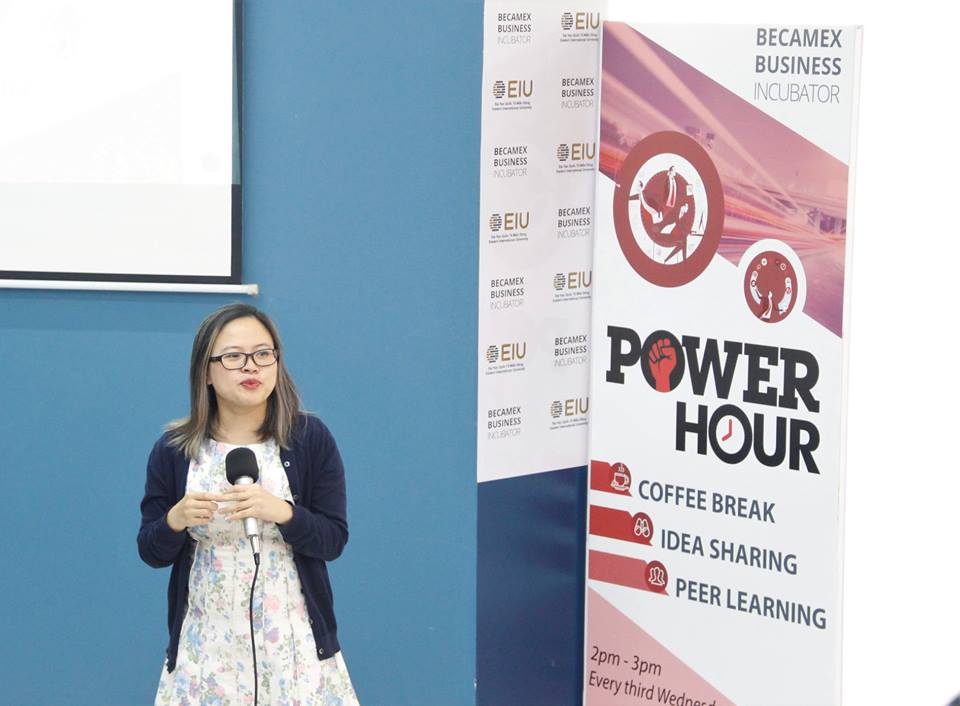IN ASIA, WE HAVE A ROLE-MODEL CULTURE — WHERE IF SOMEONE OR SOMETHING IS GOOD, WE ASPIRE TO EMULATE.
BUT IT’S VITAL TO HAVE INDIVIDUALITY TOO.

What made you interested in entrepreneurship?
Most of my family members come from a business background, and I guess you can say that they influenced me. After I graduated from the US, I came back to Vietnam as there are more opportunities in Vietnam. There is a growing market here, and there are a lot of things I can do. If I pursue entrepreneurship, I can do more for the market and the community.
What made you decide to pursue further education in technopreneurship?
I have always been interested in business and wanted to pursue a Master’s degree. Upon completion of my bachelor’s degree in the US, I returned to Vietnam and worked for a while at a university. I supported my supervisor in business development, marketing research and campaigns. I had to reach out to industries to seek collaborations with them. I enjoyed that and learned a lot about medical management and healthcare during the process.
Through that stint, I realised I was interested in learning how to run a business and to create value for the society. I was considering entrepreneurship and healthcare management studies. Eventually, I decided to go for entrepreneurship as it would give me a continuous learning mindset which could apply to the healthcare sphere. I felt that it would provide me with perspectives from the technological aspects – which is very important nowadays, especially in business. That’s why I decided to pursue NTU’s Master of Science Technopreneurship & Innovation Programme.
Did further education in technopreneurship lead to any changes in your mindset?
Definitely. The most significant change is my view of technology. It made me aware of how technology has progressed and the importance of it in business. I learned how to leverage on the technological capacity I had, to create better products and to apply innovation in the company at the same time. It allowed me to understand the life cycle of technology and how to bring it to the market. During my research, I was able to see the various processes from different viewpoints. Now I can look at things holistically and not just from a single business viewpoint.
Would you see yourself as an entrepreneur?
Yes, because I am willing to take risks – especially calculated risks! Many of the projects that I’m working on right now were initiated by me. I set the tone and build them up from scratch. Although I am an intrapreneur, I think like an entrepreneur and help to innovate in the organisation as if it is my own.

How did you take your first step in becoming an intrapreneur?
I consciously push myself to take on challenges, and I never say no to new projects. The most important thing is to take the first step out and try, even if you do not know whether you will succeed. There will always be something to learn. So, “just do it.”
What are some of the challenges you faced as an intrapreneur and how did you overcome them?
I think one of the setbacks entrepreneurs face is when people tell you that your idea will not work. Although it can be discouraging, you have to stand your ground and be persistent.
Another challenge is finding co-workers who synergise with you. However, I feel that as long as you can provide them with learning opportunities or show them a bigger picture, in the long run, it can be done.
In your opinion, is entrepreneurship an art or science?
In my opinion, when you launch a product or a company, you need to understand and be able to persuade the customers – that is a form of art. At the same time, you also have to check and calculate the capabilities and finances before deciding if you are able to make it, which is science..
One assumption is that multinational companies often stifle creativity and innovation. Do you think this is true?
It depends on the company; most MNCs have huge hierarchical organisational designs which may hinder a person’s creativity and innovation. I think most companies now do try to foster creativity, but their sheer size and long chain of command serve as obstacles. However, I believe that it’s up to the intrapreneurs to do the right thing and not to give up easily.
Could you tell us more about your job?
I work at a relatively young university, Eastern International University (EIU), in the province of Binh Duong in Southern Vietnam. Besides running the business incubator initiative in the university, I also help in building the curriculum for the entrepreneurship major.
The business incubator is an initiative to develop and turn ideas into start-ups. I am involved throughout the project, from inception to operation. Anyone can come to us – be it about developing a business plan, forming a project team, building a product, or anything related to start-up.
I also provide support to the start-up companies in various ways – as an advisor; providing guidance on their organisational structure, and helping them liaise with external vendors. I also try to link up these start-ups with EIU students through internships or employment.

Do you have any examples of how your entrepreneurial skills have helped you in your job?
It is difficult to evaluate which skills are more relevant than others. Off the top of my head – the power of management, looking at the business as a whole, and understanding different points of view are useful. These skills come with practice, and depending on the individual and his/her environment, the skills get cultivated differently.
What does work-life balance look like to you?
I try not to overload myself by taking on too many projects. I believe a person can only be stretched up to a certain point. Anything beyond that, the quality of work will be compromised. To unwind, I hit the gym and/or cook. Cooking relaxes me, and home-cooked food is healthy! I also like to travel; to explore the world, to learn new cultures and things.
What traits do you think are important for entrepreneurs to have? Do you believe one can cultivate these traits? If yes, how so?
Courage, perseverance, and willingness to take risks are important traits. You can, no doubt, cultivate these traits if you are willing to push yourself. For example, it can be quite nerve-racking the very first time you attempt risk-taking; or making a vital decision. However, as you do them on a more regular basis, you will be accustomed to them. Some of these traits come naturally. However, the environment you are in plays a part as well. It is crucial for entrepreneurs to develop qualities that enable them to better adapt to their environment.
Is it true that passion is the most important narrative in the entrepreneurship world?
For entrepreneurship or creating a business model, you have to be passionate about the product or business to create value. If you do not have passion, it will not work in the long run.
What are some of the rewarding aspects of being an entrepreneur?
Creating value and helping customers, seeing the company grow and providing employment to more people. It is rewarding to know that people benefit from my contributions.
Any advice for aspiring entrepreneurs?
You have to go out there and learn more things; learn from inside and outside the classroom, learn from your friends, family, and co-workers. When I did my studies in the US, I initially had the mindset of scoring straight As. However, during my second year, I started attending events and activities to meet new people. The experience is enriching – I picked up communication skills, perseverance, and a risk-taking mindset.
If you don’t test what you think and let people tell you what to do, you will miss the opportunities.
For more information,

https://eiu.edu.vn/home.aspx

Hanh graduated with a Master of Science in Technopreneurship and Innovation in Nanyang Technological University (NTU). Hanh currently serves as an advisor for Eastern International University’s Business Incubator initiative and also helps in the curriculum planning for entrepreneurship major.